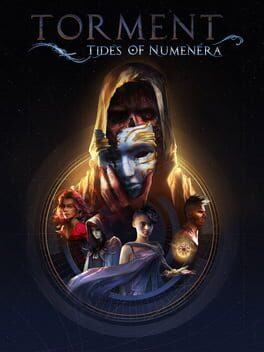

A CRPG set in the Dungeons & Dragons setting of Planescape in which The Nameless One, an immortal amnesiac, sets off on a quest across the infinite Planes and gathers a party of conflicted companions to find out who he is and reclaim his mortality. Throughout it, he faces the consequences of the horrors he committed in his past lives and tries to find the root of all the torment plaguing his companions and the Planes.
Also in series
Reviews View More
This review contains spoilers
Quite possibly the peak of "flawed masterpiece" art-stuff to grumble about re: combat mechanics, writing/design for women, clearly cut content (Fall-From-Grace's diary and Pharod's rod both being items that go nowhere, or more importantly Vhailor's potential attack of TNO in the Fortress only being a "shit-got-real" moment if you've actually met him, and completely pointless otherwise). Depending on your personal taste, the jankier CRPG mechanics might range from generally annoying to generally charming. My taste goes towards the latter.
But if you're able to forgive the game for its flaws, or find its whole to be beautiful and incredible, it's obviously just really great. Basically Disco Elysium's '90s fantasy father (somewhat literally considering this apparently was an inspiration), a RPG driven primarily by story, character, narrative, themes and geographic/social exploration. Pretty much the entire game is based on traversing areas, talking to creatures of various sorts, getting to know more and more about your own past, your companions, the City of Sigil and the world around you, truly getting to feel Sigil and the larger world as living, breathing places containing so many characters and so much wonderful, idiosyncratic detail. This is not a piece of fantasy afraid to be wonderfully imaginative. The idea is not just to allow a lot of room for self-expression (lots of variety available here in regards to what you may want to make TNO into), but also to deftly introduce a lot of detail, context and the central thematic notions here about people's inherent natures, the possibility for self-reflection and change, regret, belief, suffering; the alignments of lawful-neutral-chaotic and good-neutral-evil merely used as a way of engaging with those existential questions. In fact, everything slightly iffy about how quick this is to generally push "inherent natures" for specific races and people of certain regions is redeemed by its deliberate playing with those questions.
It’s there in practically everything, from TNO’s eternal quest for his own mortality and subsequent questions in regards to whether he even is the same person he used to be, to Dak’kon’s existential crisis despite being someone whose entire power comes from powerful faith, Fall-From-Grace’s taxing desire to go against her nature, Trias’s differing views of good that lead instead to a type of evil, Nordom’s listlessness in a world too chaotic for a creature of pure mechanized order, the entire world of Planescape itself, where belief can literally influence reality. The entire game is filled with a philosophical bent in regards to prime questions of human nature, of what we are and can be, of how our beliefs influence ourselves, others, and the places we inhabit, and it’s just thought-provoking and impeccable (if not as emotionally powerful) in those regards as Disco.
In the very end of the game, TNO travels to the Fortress of Regrets, a wide castle created entirely off the power of his past lives’ evil, and finally meets his own mortality. In the subsequent dialogue, the player has the chance to finally give a thorough answer to the one question the game has been truly explicit about-”what can change the nature of a man?”. If with Ravel there was a series of disparate answers, then now the game points towards a thematic conclusion-that essentially “whatever you believe can change the nature of a man, can.” It’s a bit of an easy answer, but it cuts right to the heart of the game’s existential preconceptions in one way-there is no correct answer to be found in the clusterfucks that are ourselves, the world and their connection, and perhaps the only thing you can really be sure of is that you should let your past catch up with you, because it’ll certainly never stop chasing you. The good ending is a genuinely beautiful illustration of that idea-TNO has entered Hell, but he was always going to end up there, he's finally accepted his fate, and is at peace with it. Incredible stuff.
loved the writing in this game i played it for quite a while and the ending felt very rewarding. the only issue i had was trying to pick people out of the maps like you cant hold ALT to highlight them or anything so i had to spend a lot of time scrubbing my mouse around looking for people that are clickable
Excellent game! I think it has aged a fair bit, and as someone who isn't familiar to the crpg genre I think I had a lot of growing pains, had to fidget the difficulty down due to a lot of mistakes when I built my character. Still though, I loved the setting and every story based thing about this game, though I found the ending rather abrupt.
I missed out on a lot of important items and character decisions, leading to me missing the true ending, but the game is so short I can give it another run through sometime in the future. The game has excellent party members, a kickass story backed by an amazingly unique setting, and is extremely charming.
The gameplay itself though, not so much. It's not the game's fault, it is nearly 30 years old, but the combat and oldschool jank did get very irritating after a while, and I seriously did not appreciate being shanked by thugs every two seconds. Still though, very glad to have played this game- this is one for the
mind vaults to cherish.
I missed out on a lot of important items and character decisions, leading to me missing the true ending, but the game is so short I can give it another run through sometime in the future. The game has excellent party members, a kickass story backed by an amazingly unique setting, and is extremely charming.
The gameplay itself though, not so much. It's not the game's fault, it is nearly 30 years old, but the combat and oldschool jank did get very irritating after a while, and I seriously did not appreciate being shanked by thugs every two seconds. Still though, very glad to have played this game- this is one for the
mind vaults to cherish.
Ah, Planescape: Torment. The only computer game to come out of the Planescape setting, an imaginative setting created for 2nd Edition AD&D that expanded upon the planar cosmology already established in 1st Edition. It was unfortunately discontinued once 3rd Edition was released, but fortunately, the cosmology stayed. I do so love it when D&D branches out into the weirder parts of the Monster Manual far removed from more conventional fantasy, and seeing as Torment was being handled by Black Isle, who were responsible for Baldur's Gate 1 and 2, this game was right up my alley.
You spend the majority of the game in Sigil, a donut-shaped city that wraps around itself and floats atop a tall spire located at the theoretical center of the planes, with many hidden portals that lead to every corner of the multiverse. It's as weird and wonderful a setting as it sounds, and I really liked how they utilized it in Torment.
The cast of characters are as unique as you would expect as well. A wisecracking floating skull, an asexual succubus, and a Scottish tiefling, to name a few. The player character is no exception: a nameless man who's committed horrific crimes against all of existence and has been cursed to reincarnate and lose a little bit more of his sense of self every time he dies. His goal is a simple one: to find his identity and atone for his crime. About what you'd expect from a game called Torment.
This is not a heroic tale, and so Planescape: Torment is very much dialogue over combat, as demonstrated in how you are much better rewarded for talking than fighting. As such, despite starting out as a generic male fighter (generic being a relative term in the Planescape setting), you're incentivized to dump points into your mental stats instead of physical. If you go into this game expecting something more balanced like Baldur's Gate, you'll be disappointed. This detracted from my enjoyment when I played it as a dumb teenager, but as I've gotten older and have branched out into different genres of games, I learned to appreciate this aspect.
My main issue now lies with the pacing. The portion of the game where you have to leave Sigil and travel the planes to search for answers is noticeably rushed. By contrast, to simply recruit the asexual succubus I mentioned earlier requires that you have lengthy dialogues with all 10 of her disciples, which can take up to an hour. And while I do realize that combat was never the priority with this game, the combat system feels a bit too underdeveloped for my liking.
Overall, Planescape: Torment, as strange and experimental as it is, is pretty solid, and is worth playing if only for the fact that it's simply one of a kind. However, I would not recommend it if you're looking for a more conventional RPG experience.
You spend the majority of the game in Sigil, a donut-shaped city that wraps around itself and floats atop a tall spire located at the theoretical center of the planes, with many hidden portals that lead to every corner of the multiverse. It's as weird and wonderful a setting as it sounds, and I really liked how they utilized it in Torment.
The cast of characters are as unique as you would expect as well. A wisecracking floating skull, an asexual succubus, and a Scottish tiefling, to name a few. The player character is no exception: a nameless man who's committed horrific crimes against all of existence and has been cursed to reincarnate and lose a little bit more of his sense of self every time he dies. His goal is a simple one: to find his identity and atone for his crime. About what you'd expect from a game called Torment.
This is not a heroic tale, and so Planescape: Torment is very much dialogue over combat, as demonstrated in how you are much better rewarded for talking than fighting. As such, despite starting out as a generic male fighter (generic being a relative term in the Planescape setting), you're incentivized to dump points into your mental stats instead of physical. If you go into this game expecting something more balanced like Baldur's Gate, you'll be disappointed. This detracted from my enjoyment when I played it as a dumb teenager, but as I've gotten older and have branched out into different genres of games, I learned to appreciate this aspect.
My main issue now lies with the pacing. The portion of the game where you have to leave Sigil and travel the planes to search for answers is noticeably rushed. By contrast, to simply recruit the asexual succubus I mentioned earlier requires that you have lengthy dialogues with all 10 of her disciples, which can take up to an hour. And while I do realize that combat was never the priority with this game, the combat system feels a bit too underdeveloped for my liking.
Overall, Planescape: Torment, as strange and experimental as it is, is pretty solid, and is worth playing if only for the fact that it's simply one of a kind. However, I would not recommend it if you're looking for a more conventional RPG experience.


